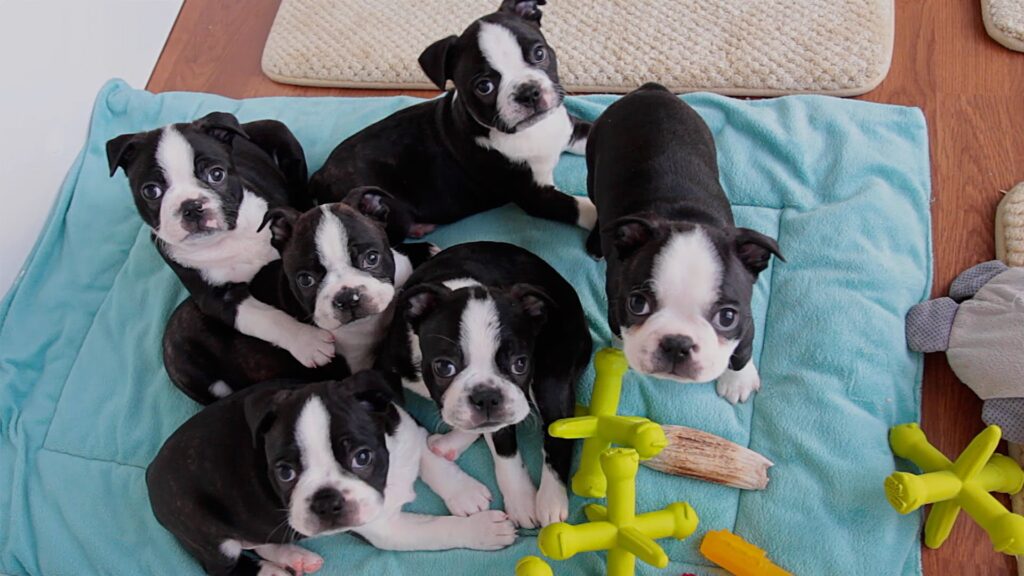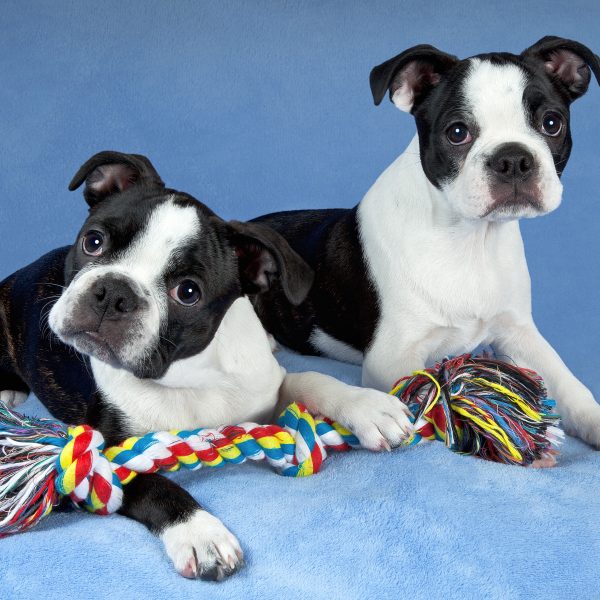AFTER YOU PURCHASE
A BOSTON TERRIER PUPPY
You’ll Need Supplies for your Boston Terrier Puppy
- Iams Puppy Chow, or Diamond Puppy Chow for small dogs or toy breeds. If the puppy won’t eat, get down on the floor and pretend to eat with him/her. If that doesn’t work, put a little hotter warm water on the food so they an smell it better and they should dig right in.
- You need a heating pad that doesn’t turn off. They are used to sleeping on those.
- You need chewy toys, don’t have to be expensive, but get quite a few.
- Check on all your cords and get them off the floor and out of little teeths’ way!


- Make sure and be careful around easy chairs as they can crush little one’s! Rocking chairs too! They crush toes.
- Watch the website for new pictures weekly.
- Be prepared for a little puppy diarrhea caused by stress. If this happens, go get instant rice and cook it, mix with a bit of yogurt and feed for a day, then very slowly start adding in the normal puppy food until in about 4 days puppy is back on all puppy food. If this doesn’t stop it, then I would get pup checked as it may have drunk from a mud puddle, eaten some cat poo or something there is a protozoan in there that may need an antibiotic to kill. If there is ever blood or mucus in the stool, that needs a vet’s attention.
- Don’t give in to the whines. If your puppy is whining the first night ignore! If you give in it will reinforce the whining. If you instead, go in to see puppy when it is silent, this reinforces the quiet!
- If puppy throws up when you get it home, it is car sick and just needs time to get the tummy settled a bit, so leave the puppy alone to sleep and then (about an hour later), offer a little food or some Pepto Bismol. You can safely give puppies 1 cc or a teaspoon of Pepto Bismol or bismuth to settle their tummy.
- Fix a place in your home (a crate) that is a safe haven, where your pup can get away from the family and kids to relax and chill out. This can be in a laundry room with a child gate. You need to have a crate, water dish (elevated so they don’t fall in head first, they can get pneumonia that way), their bedding in the crate, toys and a litter box if you wish to litter box train. Get the blue puppy pads to put into it.
- Get your Venetian blind cords up so they cannot get caught in them and choke.
- Make sure they cannot climb up on something and fall into the toilet or other water source.
- Set up an appointment with your vet to get the other three puppy shots required.
- Microchip your Boston Terrier puppy when you have it neutered or spayed for your own safety.
- Puppy proof your yard. Look for poisonous plants and holes under the fence or house where a puppy can squeeze in and not get out!
Puppies who are going to new homes need to be watched very carefully as their immune systems will be stressed when leaving mom, meeting new people and being played with vigorously. Puppies need lots of rest, sleep time and quiet time, regular feedings, and bedtimes.
Most of all, a new Boston Terrier puppy should be watched carefully for any change of bowel habits or any runny nose or wheezing. If they are going to come down with a cold, it will be during the first two weeks of acclimating to a new home.
When you take your Boston Terrier puppy to the vet for its check-up. DO NOT PUT THE PUPPY ON ANY SURFACE unless you have a clean towel from home to put between the puppy and the surface. The VETERINARY CLINIC IS THE MOST DANGEROUS PLACE YOU CAN TAKE YOUR PUP at this age. When you take your pup to the vet, make sure you take him/her in their own carrier. Do not let them out until the vet requires it. Make sure the vet has washed the scale that they weigh them on and their own hands, and the exam table prior to handling your puppy.
When you leave the vet’s it is a good idea to take some hand sanitizer and sanitize your hands and your puppy’s feet.
Remember! People take their sick dogs to the vet’s and they usually aren’t in a carrier but on a leash. They can spread their diseases to your puppy.
